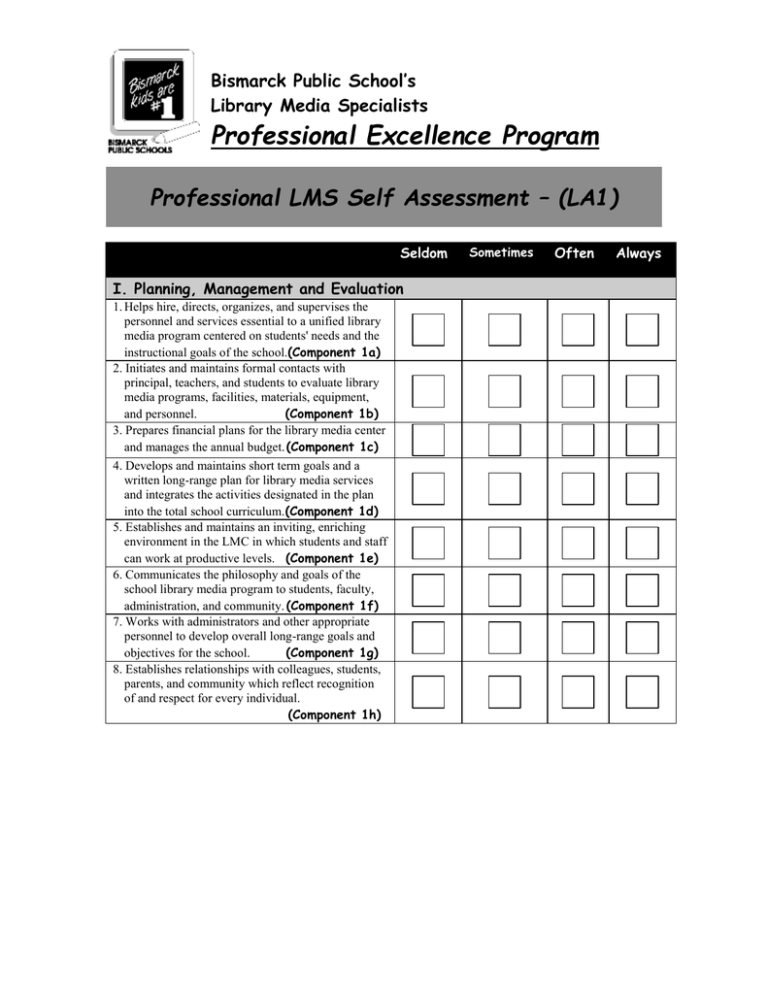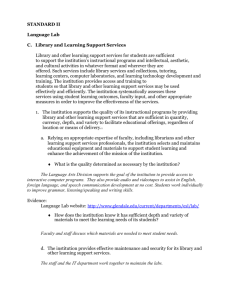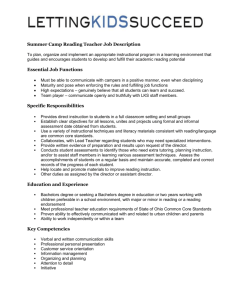Professional LMS Self-Assessment (A1)
advertisement

Bismarck Public School’s Library Media Specialists Professional Excellence Program Professional LMS Self Assessment – (LA1) Seldom I. Planning, Management and Evaluation 1. Helps hire, directs, organizes, and supervises the personnel and services essential to a unified library media program centered on students' needs and the instructional goals of the school.(Component 1a) 2. Initiates and maintains formal contacts with principal, teachers, and students to evaluate library media programs, facilities, materials, equipment, and personnel. (Component 1b) 3. Prepares financial plans for the library media center and manages the annual budget. (Component 1c) 4. Develops and maintains short term goals and a written long-range plan for library media services and integrates the activities designated in the plan into the total school curriculum. (Component 1d) 5. Establishes and maintains an inviting, enriching environment in the LMC in which students and staff can work at productive levels. (Component 1e) 6. Communicates the philosophy and goals of the school library media program to students, faculty, administration, and community. (Component 1f) 7. Works with administrators and other appropriate personnel to develop overall long-range goals and objectives for the school. (Component 1g) 8. Establishes relationships with colleagues, students, parents, and community which reflect recognition of and respect for every individual. (Component 1h) Sometimes Often Always Seldom Sometimes II. Teaching and Collaborating 1. Promotes life-long reading and learning in students, staff, administration, and community members. (Component 2a) 2. Plans, teaches, collaborates, and reinforces instruction designed to make students and staff effective and efficient users of ideas and information. (Component 2b) 3. Instructs students and staff on the rights and responsibilities of users relating to the generation and flow of information and ideas (e.g., copyright, confidentiality/ privacy, plagiarism, intellectual freedom). (Component 2c) 4. Promotes, instructs, and assesses students and staff in the use and management of current and new instructional technologies. (Component 2d) 5. Assesses student information skills and the research process they use. (Component 2e) 6. Collaborates in the development of complete instructional units with teachers, using an instructional design process. (Component 2f) 7. Participates in district, building, department, and grade-level curriculum design and assessment projects. (Component 2g) III. Professional Responsibilities as Information Specialists 1. Provides resources to students and staff through a systematically developed and organized collection of library media materials and resources available inside and outside the school. (Component 3a) 2. Keeps abreast of current literature, research, and trends by reading professional literature, networking through professional organizations, and continually updating professional expertise through education. (Component 3b) 3. Assures access to information resources by providing an accurate catalog and efficient retrieval system. (Component 3c) 4. Implements policies and practices that respect the rights of users to confidentiality and unrestricted, equitable access to information resources. (Component 3d) 4. Assists all users in accessing, assessing, and applying information. (Component 3e) 5. Provides flexible schedule to support classroom teaching and learning with open access to the library facility, resources, services, and staff to meet needs of individuals, small groups, and classes for various purposes (i.e., research, browsing, recreational reading, viewing, or listening at the point of need). (Component 3f) Often Always



